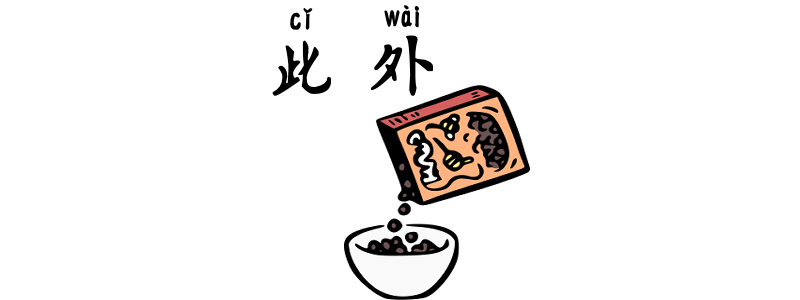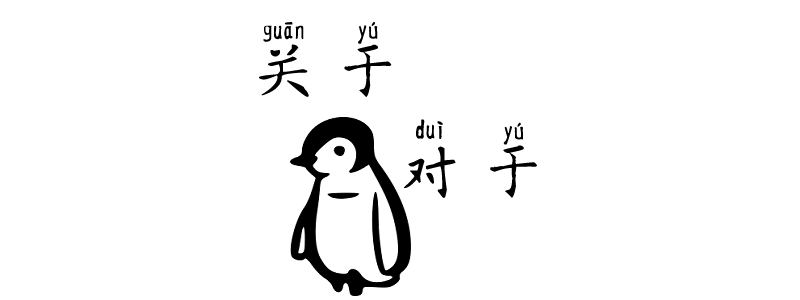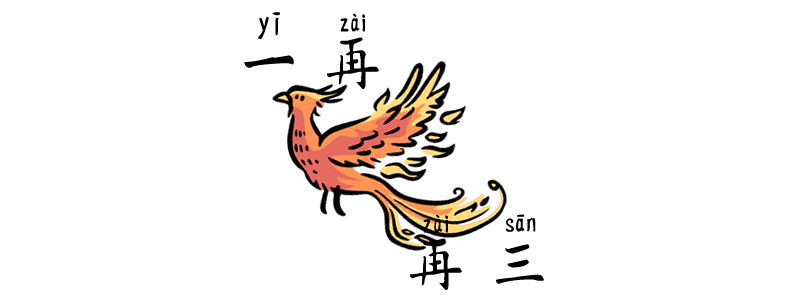Grammar Point:In Chinese, the word 可見见 kějiàn is a conjunction that that can be translated as “indicate” or “means.” It is often used to summarize the meaning of a previous statement. Structure Situation + kějiàn + Conclusion 可見见 kějiàn is often used when a speaker wants to express a judgment or insight based on facts,…
Category: HSK 4
“Moreover” in Chinese 2 – cǐwài
Grammar Point:此外 cǐwài means “in addition” or “moreover” in Chinese. It is used to introduce additional information or points that are related to the topic being discussed. Structure Statement 1 + 此外 cǐwài + Statement 2 他tā很hěn聰明cōngmíng, 此外cǐwài他tā還hái很hěn努力nǔlì他tā很hěn聪明cōngming, 此外cǐwài他tā还hái很hěn努力nǔlìHe is very smart, and moreover, he is very hardworking. 我們wǒmen公司gōngsī提供tígōng免費miǎnfèi午餐wǔcān, 此外cǐwài還有háiyǒu健身房jiànshēnfáng可以kěyǐ使用shǐyòng我们wǒmen公司gōngsī提供tígōng免费miǎnfèi午餐wǔcān, 此外cǐwài还有háiyǒu健身房jiànshēnfáng可以kěyǐ使用shǐyòngOur company provides free lunch,…
Decimal, fraction, percentage, and multiple in Chinese
Here’s how Chinese expresses decimal, fraction, percentage, and multiple: Decimal 小數数 xiǎoshù: In Chinese, decimals are expressed using the same format as in English, with a decimal point. If the digits after the decimal point exceed two, we read them individually. 0.5: 零líng點diǎn五wǔ零líng点diǎn五wǔ 12.25: 十二shíèr點diǎn二èr五wǔ十二shíèr点diǎn二èr五wǔ 3.724: 三sān點diǎn七qī二èr四sì三sān点diǎn七qī二èr四sì 72.0029: 七十二qīshíèr點diǎn零líng零líng二èr九jiǔ七十二qīshíèr点diǎn零líng零líng二èr九jiǔ Fraction 分數数 fēnshù: To express fractions…
“Instead of” in Chinese – tì and dàitì
Grammar Point:In Chinese grammar, 替 tì and 代替 dàitì are prepositions used to indicate substitution or acting on behalf of someone or something. Structure Noun/Pronoun + 替 tì + Noun/Pronoun + V The nouns and pronouns here usually are human not objects. 他tā替tì我wǒ做zuò了le很hěn多duō工作gōngzuò他tā替tì我wǒ做zuò了le很hěn多duō工作gōngzuòHe did a lot of work for me. (substitution) 我wǒ替tì老闆lǎobǎn接jiē了le電話diànhuà我wǒ替tì老板lǎobǎn接jiē了le电话diànhuàI answered the phone…
“Regarding” in Chinese 1 – guānyú and duìyú
Grammar Point:In Chinese, guānyú 關於关于 and duìyú 對於对于 are both prepositions that can be translated as “about” or “regarding” in English, but they are used slightly differently. Structure Guānyú + N or N Phrase It names a topic and often emphasizes a range, then introduces a comment related to it. 關於guānyú這個zhège提案tíàn, 你nǐ有yǒu什麼shénme想法xiǎngfǎ嗎ma? 关于guānyú这个zhège提案tíàn, 你nǐ有yǒu什么shénme想法xiǎngfǎ吗ma? Regarding…
“According to” in Chinese 2 – gēnjù
Grammar Point:The Chinese word 根據据 gēnjù means making decisions or taking actions based on reasons or evidence, similar to “according to” or “based on” in English. It’s used when referring to using evidence, following instructions, or making decisions based on specific information. Structure 根據据 gēnjù + N 根據gēnjù今天jīntiān的de天氣tiānqì預報yùbào, 明天míngtiān可能kěnéng會huì下雨xiàyǔ根据gēnjù今天jīntiān的de天气tiānqì预报yùbào, 明天míngtiān可能kěnéng会huì下雨xiàyǔAccording to today’s weather forecast, it…
“In a hurry” in Chinese – jímáng
Grammar Point:In Chinese, 急忙 jímáng is an adverb that means “hurriedly” or “in a hurry.” It is often used to describe actions that are done quickly or urgently. Structure 急忙 jímáng + V 他tā急忙jímáng走zǒu了le過去guòqù他tā急忙jímáng走zǒu了le过去guòqùHe hurried over. 我wǒ急忙jímáng給gěi他tā倒dào了le杯bēi水shuǐ我wǒ急忙jímáng给gěi他tā倒dào了le杯bēi水shuǐI hurriedly poured him a glass of water. 你nǐ急急忙忙jíjímángmáng地de是shì要yào去qù哪裡nǎlǐ? 你nǐ急急忙忙jíjímángmáng地de是shì要yào去qù哪儿nǎr? Where are you rushing off to in such a…
“About to” in Chinese – jíjiāng
Grammar Point:The Chinese word 即將将 jíjiāng means “soon” or “about to.” It indicates that an event or action is imminent or approaching in the near future. It conveys the sense of something happening shortly or being on the verge of occurring. Structure jíjiāng + Verb 即將将 jíjiāng is generally considered a formal term in Chinese….
“Repeatedly” in Chinese
Grammar Point:一再 yízài and 再三 zàisān are both Chinese expressions that convey the idea of “repeatedly” or “again and again.” While they share a similar meaning, there are nuanced differences in how they are used. Structure 一再 yízài In Chinese, the word 一再 yízà emphasizes the idea of doing something repeatedly or continuously, often to…
Not necessary in Chinese – 未必 wèibì
Grammar Point:The Chinese word 未必 wèibì means “not necessarily” or “may not necessarily” in English. It leaves room for the possibility that things could be different or may not turn out as expected. Structure 未必 wèibì + V / Adj / Clause 這個zhège文法wénfǎ未必wèibì簡單jiǎndān这个zhège文法wénfǎ未必wèibì简单jiǎndānThis grammar may not necessarily be simple. 他的tāde計劃jìhuà未必wèibì會huì成功chénggōng他的tāde计划jìhuá未必wèibì会huì成功chénggōngHis plan may not necessarily succeed….








